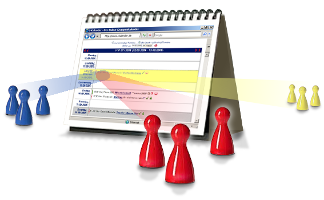Read- and write rights on appointments:
Basically a user can:
-
see an appointment, if the user has
read-rights on MINIMUM ONE of the assigned appointment-groups
-
edit an appointment, if the user has
write-rights on ALL of the assigned appointment-groups
Reading Rights - "Who sees what?" - in Detail:
here are different settins in CCalendar, who can view which appointments and contents.
You make the main settings in the
participant settings.
But because also other settings like "fixed" / "planned" appointment, "internal" / "public" appointment, document rights as welll as booking system influence the rights, we made a matrix here where you can view in detail who can or cannot see what:
| |
Can
assign rights
|
Can view
public,
fixed
appointment
"to all" |
Can view
public,
planned
appointment
"to all" |
Can view
internal,
fixed
appointment
"to all" |
Can view
internal,
planned
appointment
"to all" |
Can view
public,
fixed
appointment
to certain appointment group |
Can view
public,
planned
appointment
to certain appointment group |
Can view
internal,
fixed
appointment
to certain appointment group |
Kann
internen, geplanten
Termin
to certain appointment group |
Can view
public
document |
Can view
non-public
document
"to all" |
Can view
non-public
document
to certain appointment group |
| Admin |
Yes |
Yes |
Yes |
Yes |
Yes |
Provided that reading rights for at least 1 dedicated appointment group are existing.* |
Provided that reading rights for at least 1 dedicated appointment group are existing.* |
Provided that reading rights for at least 1 dedicated appointment group are existing.* |
Provided that reading rights for at least 1 dedicated appointment group are existing.* |
Yes |
Yes |
Provided that reading rights for at least 1 dedicated appointment group are existing.* |
| User |
No |
Yes |
Yes |
Yes |
Yes |
Provided that reading rights for at least 1 dedicated appointment group are existing. |
Provided that reading rights for at least 1 dedicated appointment group are existing. |
Provided that reading rights for at least 1 dedicated appointment group are existing. |
Provided that reading rights for at least 1 dedicated appointment group are existing. |
Yes |
Yes |
Provided that reading rights for at least 1 dedicated appointment group are existing. |
| Guest |
No |
Yes |
No |
No |
No |
Provided that reading rights for at least 1 dedicated appointment group are existing. |
No |
No |
No |
Yes |
No |
No |
| Website Visitor |
No |
Yes |
No |
No |
No |
Provided that this appointment group is shown on the website. |
No |
No |
No |
Provided it is assigned to an appointment visible to the visitor. |
No |
No |
| Authenticated Booking Person |
No |
No |
No |
No |
No |
Provided it is a BOOKABLE appointment group. Details only, when OWN BOOKING, otherwise generalized data. |
Provided it is a BOOKABLE appointment group. Details only, when OWN BOOKING, otherwise generalized data. |
No |
No |
Provided it is assigned to an appointment visible to the booking person. |
No |
Provided it is assigned to an appointment visible to the booking person. |
| Non-authenticated Booking Person |
No |
No |
No |
No |
No |
Provided it is a BOOKABLE appointment group, however only shown generalized. |
Provided it is a BOOKABLE appointment group, however only shown generalized. |
No |
No |
No |
No |
No |
* Admin can assign reading rights to himself any time.
Please also note the difference between Booking Person (Client of the booking system) and Website Visitor (Visitor of a website with implemented module appointment ticker or appointment list.).

